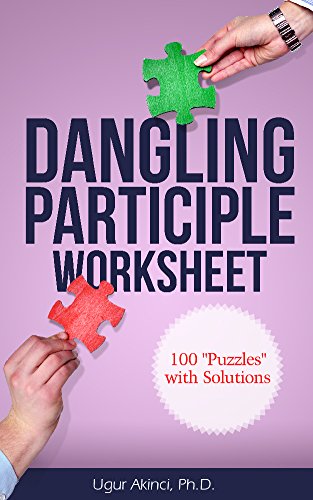
Dangling Participle Worksheet: 100 “Puzzles” with Solutions Kindle Edition

What is a Dangling Participle?
A dangling participle is a phrase, clause, or word that is not grammatically connected to the rest of the sentence.
A dangling participle can be a phrase or clause that begins with words like “after,” “although,” “as,” “because,” “before,” “however,” and many more.
What Causes a Dangling Participle?
A dangling participle is a phrase that starts with a verb and ends with a noun. It is typically used incorrectly in sentences where the writer has forgotten to include a noun.
One of the most common causes of dangling participles is when the writer has forgotten to include a noun after the verb.
An Example of Dangling Participle
For example, “Raining hard, they opened their umbrellas.” In this sentence, there is no noun following the verbal phrase”raining hard” so it sounds as though “they” were the ones who rained. A better sentence would be “Since the rain was raining hard, they opened their umbrellas.”
What are the Common Mistakes People Make When Using a Dangling Participle?
Some common mistakes people make when using a dangling participial phrase are:
– The sentence starts with an action, but there is no subject that completes the action.
– The sentence starts with an object, but there is no subject that completes the action.
– The sentence starts with a prepositional phrase, but there is no subject that completes the action.
How to Fix the Problem of the Dangling Participle?
The most common mistake is when the participial phrase is separated from the verb it should be modifying.
The sentence, “Having changed my battery, I drove the car to NYC,” contains a dangling participle because “having changed” does not modify “the car.” It modifies the pronoun “I.”
The Dangling Participle Worksheet Book
This is a comprehensive worksheet of 100 puzzling sentences with solutions for students and teachers alike. Over 4,300 words.
Why do we call these sentences a “puzzle”?
An Example
Consider a classic example such as:
“After being diced, the cook added the onion to the omelet.”
Isn’t that puzzling – a cook getting diced!?
Actually that unintended effect is due to the misplaced verb participle “being” which threw the whole sentence out of balance and turned it into a linguistic puzzle indeed.
The dangling participle sentences in this special report are mostly taken from current news stories about real world events to keep the students engaged with the content.
An Ideal Exercise Set
An ideal exercise set both for the students who are learning English and the teachers who would like to offer lively fresh examples to their students about the correct way to form a sentence without dangling participles.
A true time-saver and a useful teaching aid for teachers. With this worksheet, you can concentrate more on your teaching than waste time trying to come up with good examples of a dangling participle. With 100 great examples, you won’t repeat yourself in class anytime soon either.
Each exercise sentence in this special report is followed by its “solution,” that is, the proper way the same sentence should’ve been constructed in the first place.
If you’d like to make a guess at the solution yourself, use a sheet of paper to cover the answer and then try to come up with a solution yourself. Then uncover the solution and compare yours to the proposed answer.
